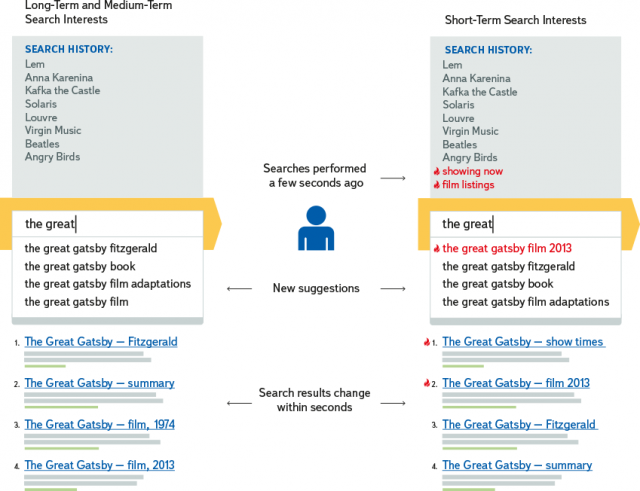 Yandex has today announced an iteration of its personalised search results, which sees the Russian search leader add a new real-time dimension to the personalisation features it launched in December 2012. The roll out back then allowed Yandex to consider users’ broader search history over the medium- and long-term and subsequently “shuffle up” results to make them correspond with a given user’s more permanent interests.
Yandex has today announced an iteration of its personalised search results, which sees the Russian search leader add a new real-time dimension to the personalisation features it launched in December 2012. The roll out back then allowed Yandex to consider users’ broader search history over the medium- and long-term and subsequently “shuffle up” results to make them correspond with a given user’s more permanent interests.
Up until now, however, if a user would conduct a search about something he/she had never searched for in the past, Yandex would switch off personalisation due to a lack of data. But this is now changing.
Starting today, Yandex will begin analysing search sessions in real-time and instantaneously react to searches as they occur. The iteration, Yandex says, will affect all of its 93 million monthly users, according to comScore Media Metrix, and essentially allows the Russian search leader to provide personalised search results even for users who do not have any previous search history.
According to Yandex, more than half of all searches on its platforms are about something that interests the user at this very moment and stops to interest them the moment after.
Personal interests cannot be limited to only a few key topics. Together with the more or less stable interests, there are those that are transient, momentary. They come and go. They do not last longer than 24 hours. More than half of all interests are short-lived.
By relying on the medium- and long-term interest alone, a user who has shown a keen interest in books, for example, would consistently see Fitzgerald’s The Great Gatsby at the top of search results when typing in “the great”. But what if that same user had just searched for “film listings” and then the moment after types in “the great”? Would it not be more likely that he/she, despite having shown a general preference of books over films, is actually looking for the recent Hollywood interpretation of Fitzgerald’s bestselling 1925 novel? As shown in the graphic below, the new feature allows Yandex to take into account this recency element and tweak results accordingly.
Does it work in the exact same way as Google’s “previous query”?
Google has been personalising search results based on the previous query of a searcher since 2008, though it happens only for a very small fraction of total searches (0.3% according to Google’s Matt Cutts). Yandex too has used one previous query to influence the following result – albeit since 2010.
With today’s move, however, Russia’s leading search player now seems to be taking it one step further by giving much greater emphasis to the short-term intent of users. Since search personalisation took effect in December, Yandex has been personalising about 60% of queries for 30% of its user base. These “relatively” low figures are due to the fact that personalisation (when relying on the medium/long-term search history alone) would only kick in for users who had provided sufficient information to justifiably determine their more deeply-rooted interests. Now, with the recency factor being added to the equation, Yandex expects to personalise results for 85% of queries for ALL of its users, a company spokesperson let us know.
Additionally, while Yandex’s search team does not want to disclose the exact number of actions being counted within a given search session, the company does say that it will store a search session for two hours. For example, if you are a frequent online shopper who recently typed in “travel to Brazil” and followed that up by a search for “Amazon”, it is likely that, say, a Wikipedia article about the Amazon River will trump the popular online shopping site by the same name. If, however, you would shut down your search session and go back to Yandex three hours later and type in Amazon yet again, positions are likely to have changed.
Focusing on immediate needs especially makes sense in a mobile era
Although I have not had a chance to play around with it yet, it does make sense to give greater weighing to immediate intent. One of the reasons for this, I find, is the continuous shift from desktop to mobile. In this regard, mobile searches tend to be significantly more solution/goal-oriented and less informational. When being on-the-go, more often than not you are looking for solutions to solve a specific problem you are facing right here, right now (which may very well be isolated from your permanent interests). Google, by the way, is doing a terrific job with “Google Now”, which proactively serves up cards with relevant contextual information without you even having to explicitly search for it.
Moreover, search queries are generally shorter on mobile devices for usability reasons. So if you actually do have to go through the hassle of typing in a query yourself (note slight irony), it is arguably more likely that you will type in “great Gatsby” or “film listings” as separate searches than “great Gatsby film listings” all in one.
A good addition to help avoid being “locked up” in your own interests
When Yandex first announced search personalisation at a Moscow conference, the Deputy CTO of the company, Grigory Bakunov, said that Yandex had seen some very encouraging results from an appropriate level of personalisation, such as 37% higher click-through-rate on a personalised top result. I have highlighted “appropriate” because Yandex’s own research showed that users deemed completely personalised results less relevant. Users simply did not want to get locked up in their own interests. And today’s announcement of the real-time dimension will further help avoid that.
You can find additional information on the new personalisation feature here or check out this video. Or alternatively, if you would like to catch up on the evolution of personalised search and where it is headed, I did a fairly long-form piece following Yandex’s announcement back in December.










One Response
test 2 – in response to bry’s comment